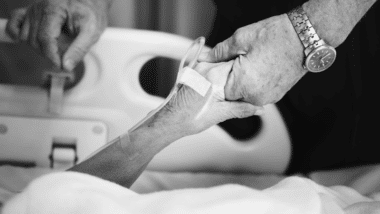The Christian Institute has told the Scottish Parliament’s Health Committee that any change to the law on assisted suicide would be “hugely damaging” to society.
In its response to the Committee’s call for evidence on Liam McArthur MSP’s Assisted Dying Bill, the Institute said the legislation would devalue the lives of vulnerable people, risked such people being coerced into ending their lives, and would also fundamentally change the relationship between doctors and their patients.
The Bill would allow those aged 16 or over deemed to be ‘terminally ill’ and who have been resident in Scotland for at least twelve months to get help to kill themselves.
‘Broad’ definition
‘Terminally ill’ is defined in the legislation as someone who has “an advanced and progressive disease, illness or condition from which they are unable to recover and that can reasonably be expected to cause their premature death”, but the Institute said this was “very broad”.
The Bill’s definition could include heart disease and progressive neurological conditions, but the Institute also pointed out that in Oregon, assisted suicides have been approved for conditions such as anorexia, hernias, and arthritis, while in Belgium and the Netherlands, patients with eating disorders were considered eligible for euthanasia as their conditions were deemed ‘hopeless’ or ‘untreatable’.
It noted that in other jurisdictions, eligibility requirements have also been quickly watered down, such as in Canada, where just five years after legalising euthanasia, legislators scrapped the requirement for a person to be terminally ill.
Doctors’ opposition
Liam McArthur’s Bill sets out other so-called safeguards, which include a “test of non-coercion” and a “period of reflection”.
However, the Institute warned it will be impossible to guarantee the absence of coercion once assisted suicide becomes an option, and that many vulnerable people may choose it out of fear of being a burden on others. It also said the 14-day reflection period is “far too short, given the irreversible nature of the decision”.
Surveys also demonstrate a reluctance among medics to be involved, with the Institute explaining: “Opposition to assisted suicide among doctors is highest for those who are most involved in end-of-life care.
“When the British Medical Association polled its members in 2020, the majority of those working in palliative care or geriatric medicine were opposed to a change in the law. And although overall half of respondents supported a change in the law, only 36 per cent said they would be willing to prescribe the drugs themselves.
“In 2022, the Association of Palliative Medicine asked its members in Scotland about their views on assisted suicide. Almost all said they would not prescribe lethal drugs, even if patients asked for them. Around nine in ten rejected the idea that safeguards would protect vulnerable people, and 43 per cent would resign if assisted suicide was introduced in their healthcare setting.”
‘Surrendering to despair’
The Institute’s Head of Policy and Research David Greatorex said: “The Bill would usher in a major and hugely damaging change to Scottish society. It would mean that, for the first time, doctors could approve the intentional taking of life as an acceptable option for some.
“The Bill’s title is itself an attempt to obfuscate, confuse and sanitise its objectives. A survey in 2021 found that less than half of respondents knew what ‘assisted dying’ meant. In reality, it is an assisted suicide Bill, designed to allow people to help others to kill themselves.
“Legalising assisted suicide would make a mockery of the State’s efforts to reduce suicide in Scotland through its Suicide Prevention Strategy – ‘Creating Hope Together’. This Bill does the very opposite of creating hope: it endorses surrendering to despair.”
‘Duty to die’
He continued: “The Bill’s supporters say it is about compassion. But true compassion for those who are deemed to be terminally ill means valuing their lives, giving them hope and supporting high-quality palliative care for all who need it.
“Making assisted suicide an option would inevitably put vulnerable people under pressure to consider that option. Making assisted suicide a ‘right’ will quickly turn it into a ‘duty’. The law’s current prohibition on helping others kill themselves is an important safeguard against coercion and pressure, and must be kept in place.”
Mr Greatorex concluded: “Proponents of assisted suicide may claim the ‘slippery slope’ argument does not hold water, but evidence from abroad is clear that the law does not remain fixed after legalisation.
“Scotland must not legalise assisted suicide even under the narrowest of circumstances, because once the principle is conceded, activists will not rest until it is as wide as possible and almost anything goes. Once it is legal for some, where do you stop?”

Holyrood urged to avoid ‘ethical disaster’ of assisted suicide for dementia patients
Isle of Man faces advancing threat of state-sponsored suicide
House of Lords to consider ‘dangerous’ assisted suicide Bill

